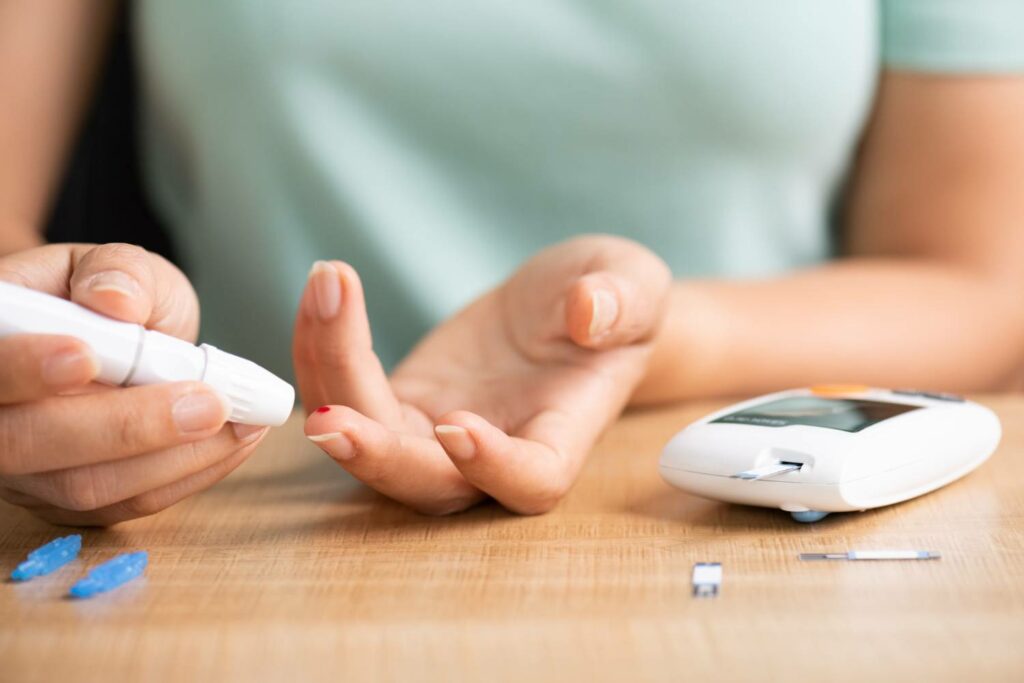Diabetes is scary-common in the U.S.—but the freakiest thing about it might be the number of people who are walking around undiagnosed. Of the 30 million people in the U.S. with diabetes, 25 percent aren’t aware they have the disease, according to data from the CDC. That’s probably because diabetes symptoms are often subtle, meaning many easily miss or dismiss them.
Left untreated, it can lead to an increased risk of heart disease, nerve damage, and dementia down the road
Here are 13 surprising diabetes symptoms that should definitely be on your radar:
You Have To Pee. All. The. Time

When you have excess sugar coursing through your bloodstream, your body instinctively tries to get rid of it. Water follows sugar, so you end up having high-volume urine loss.
If you notice you’re suddenly peeing a lot, and more often, for no real reason—especially if you’re waking up a few times during the night to take a whiz—it’s time to talk to your doctor, she says.
You’re Constantly Thirsty

With all that peeing, dehydration is a very real possibility. And, to make matters worse, some people who don’t know they have diabetes quench their thirst with sugary drinks like soda or juice, which adds to their blood sugars. Signs of dehydration include dark-colored urine, a drop in (water) weight, and extreme thirst.
Sound familiar? Talk to your doc about this potential symptom of diabetes, especially if it occurs in tandem with lots of potty breaks.
Your Breath Is Rank

Diabetes-related dehydration contributes to dry mouth and the bad breath that can accompany it. (After all, with a dry mouth, there’s not enough spit to wash away bacteria and balance the pH in your mouth.)
What’s more, undiagnosed or uncontrolled diabetes can trigger ketosis, a process in which the body uses fat rather than glucose for energy. Ketosis releases a chemical byproduct called ketones, which can make your breath smell unpleasantly sweet or fruity.
Unless you’re on a keto diet (which is designed to put you into ketosis), it’s worth talking to your doctor.
You Need New Glasses

Blurry vision is a common—and often ignored—diabetes symptom in women. What does diabetes have to do with your vision? Kellis explains that fluid can form in your eye’s lens as sugar levels increase (remember: fluid follows sugar).
A buildup of fluid in the eye blurs vision, causes nearsightedness, and leads many people to optometrists for new glasses or contacts prescription. Fortunately, controlling your blood sugar can clear up blurred vision.
Your Hands and Feet Get Numb A lot

Neuropathy—a condition characterized by numbness or weird sensations like pins and needles in your arms, legs, hands, and feet—occurs in more than half of people with type 2 diabetes, according to a 2017 Diabetes Care review.
Why so common? Diabetes reduces blood flow to your extremities and, over time, damages your blood vessels and nerves.
You Have A Lot of Cuts and Bruises-And They Take Forever To Heal

Reduced sensation in your extremities makes you more prone to injuries. You’re less likely to notice a cut because you can’t feel it, which means you’re less likely to take care of it, and it’s more likely to get infected. And once you do have an injury, uncontrolled diabetes can make it harder for your body to heal. Hangnails, for example, may be caused by diabetes.
Because diabetes is also often accompanied by high blood pressure and high cholesterol, the resulting plaque buildup can narrow blood vessels, reducing blood supply to slow healing. And diabetes can weaken the T-cells that make up your immune system—your body’s defense against infection. When you have high blood sugar, it’s like delaying your body’s army to go to the wound to heal it.
You’re Dropping Pounds-Without Trying

Unexplained weight loss can happen for lots of reasons, and diabetes is one of them. Insulin helps your body move sugar from your blood to your cells, so when you have insulin resistance, you don’t get enough energy into your cells despite all that sugar flowing through your body. Because you’re unable to get enough energy from sugar, your body burns your own fat and muscle for energy.
Weight loss can be pretty significant, sometimes 10 to 20 pounds. Generally, doctors recommend visiting the doc if you unintentionally lose between 5 to 10 percent of your body weight over the course of six months.
You’re Crazy Tired

Carbohydrates, which your body breaks down into glucose, are your body’s main source of energy. But your body can’t effectively use that energy source when you have diabetes. (And diabetes-related dehydration can also bring on fatigue.)
Of course, you could be feeling exhausted for many other reasons, including your diet, stress levels, and how much you’ve been sleeping.
Still, if you can’t think of any other good reason for your extreme fatigue, and some of these other diabetes symptoms accompany your low energy levels, it’s worth getting checked out.
You’ve Got Some Yeast Down There

High blood sugars create an environment in your vagina that’s ripe for yeast infections. Glucose is fuel for yeast. The more that’s around, the more they can multiply.
If you have two to three yeast infections every few months or if the standard treatments aren’t working, it’s time to see a doctor. Once blood sugar is controlled, the frequency goes down.
You’re Skin Is Splotchy

Darkening skin around the nape of your neck and under your armpits is a surprising and common early sign of insulin resistance, the precursor to diabetes.
This often occurs in women with polycystic ovary syndrome (PCOS). Women with PCOS are at an increased risk of insulin issues. What’s more, the skin under your arms is relatively thick and encounters a lot of regular friction. So, if you’re dehydrated, the skin there will likely show it.
Obviously, lotion or a trip to the dermatologist is the first step when your skin is ashy, but if your dry, discolored skin won’t go away or occurs alongside other diabetes signs, talk to your primary care doc.
Feeling Hungry All the Time

Feeling hungry is normal and is usually a response to vigorous exercise, increased activity, or going without a meal. However, feeling hungry all the time is not normal. It can result from a serious illness like depression, stress, or even diabetes.
When blood glucose levels are extremely high, such as in diabetes, glucose from the blood can’t get into the cells. You don’t have much energy, so you feel hungry all the time.
Frequent Headaches

Could diabetes be to blame for your headaches? There are hundreds of causes for headaches, so it can be hard to determine whether or not diabetes is causing them. Diabetes headaches can be the result of low or high blood glucose. Headaches can signal that your blood sugar is outside of your target range.
The more your blood sugar drops and spikes, the more headaches you’ll have. If you get your blood sugar under control, you’ll have less chance of developing diabetes-related headaches.
You’re Moody and Grumpy

When your blood sugar is out of whack, you don’t feel well and might become more short-tempered. In fact, high blood sugar can mimic depression-like symptoms.
You feel very tired, and you don’t feel like doing anything. You don’t want to go out, and you want to sleep. Some feel they need to be treated for depression but then experience mood improvement after their blood sugar normalizes.







